




velopment key to improved service delivery
34. Addressing electricity challenges Minister Kgosientsho
Ramokgopa dives deep into SA’s power stations
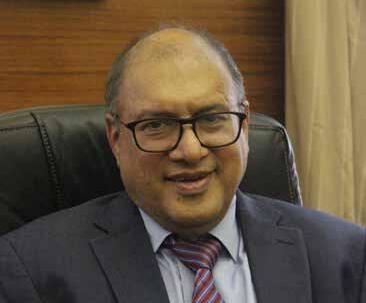

36. Analysing senior management performance in the Public Service
Supporting senior managers for public service efficiency
climate crisis through global collaboration
26. Using competency frameworks to build a capable state
How do we measure and achieve public service excellence?
32. Upscaling eLearning in the public sector
Advanced professional de-
38. Government leaders discuss innovation in the Public Service International conference highlights new approaches to service delivery
40. Public-private partnership ensures water supply in Northern Cape
Changing lives through the Vaal-Gamagara Water Supply Scheme

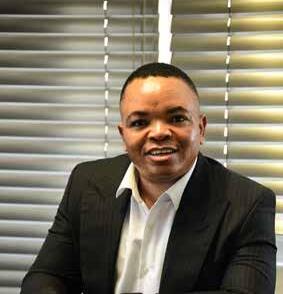

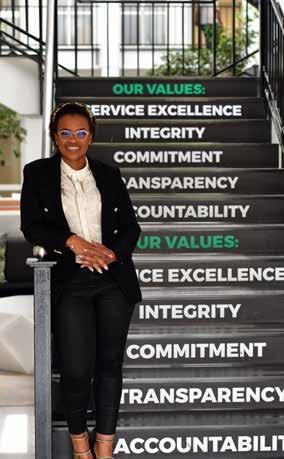
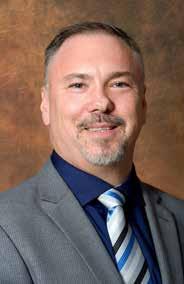
It has been two years since President Cyril Ramaphosa announced the establishment of Operation Vulindlela to drive a farreaching economic reform agenda for South Africa, thus shifting our economic growth trajectory and enabling investment and ultimately, job creation.
The primary role of the initiative is to monitor progress on priority reforms while providing support, where necessary, to accelerate their implementation.
The operation is a joint initiative of The Presidency and National Treasury to timeously drive the implementation of structural reforms in support of economic recovery. It aims, among other things, to modernise and transform network industries, including electricity, water, transport and digital communications.
According to the 2022/23 Q3 Progress Report for Operation Vulindlela, a strong collaborative approach between implementing departments and Operation Vulindlela has resulted in a number of significant policy shifts that will enable accelerated and more inclusive growth in the years ahead.
The report notes that two years into the programme, the initiative has paved the way for private investment in electricity generation for the first time, with reforms underway to establish a competitive electricity market; cleared the backlog of wateruse licences and re-engineered the licence application system, unlocking billions of Rand in investment; and ended a more than 10-year delay in the auction of high-demand spectrum, enabling substantial new investment in telecommunications.
With some reforms having been completed, the initiative has added four new priority reforms, including creating an appropriate legislative framework for hemp and cannabis, enabling the devolution of passenger rail functions to local government, titling reform for low-cost housing and the development of a fit-forpurpose procurement regime for state-owned entities.
Other Operation Vulindlela achievements include facilitating the introduction of private sector participation in container terminals, to crowd in investment and improve the efficiency of port
operations; undertaking a comprehensive review of the work visa system, with recommendations to overhaul the system and attract skills and investment; and publishing a new critical skills list for the first time since 2014, with new occupations in information technology and other sectors with a skills deficit.
The report further highlights that Operation Vulindlela also adopted a new National Rail Policy to guide the modernisation and reform of the rail sector, including the introduction of third-party access to the rail network; developed and secured passage of legislation to create
a transport economic regulator, reform the electricity sector, and establish a National Water Resources Infrastructure Agency.
Implementing accelerated economic reforms will ensure energy security, reducing red tape and lower the cost of doing business through improved transport and communication infrastructure.
The report further outlines that “the cumulative effect of these gains is compounded over the long term, raising potential growth and lifting real gross domestic product above the 2022 Medium Term Budget Policy Statement baseline by a cumulative R438 billion by 2030”.
Operation Vulindlela is a typical example of the power of collaboration in ensuring that government delivers its promises to the people of South Africa.
As President Cyril Ramaphosa proclaimed in his 2023 State of the Nation Address: “If we work together and act boldly and decisively, leaving no one behind, we will be able to resolve our challenges”. May we put on our boots of service delivery and continue to serve the masses of South Africa with distinction.

On 27 April 1994, South Africa held its first national democratic elections, ending years of discrimination, apartheid, segregation, colonialism and repressive labour policies. It was a memorable noteworthy event for the previously marginalised who had been denied the grand opportunity to cast their vote over the years.
For the millions of voters who courageously braved the long, winding queues on that day, the day represented hope – an end to suffering.
While the day marked the dawn of democracy, where all people were to equally enjoy human and citizen rights, government inherited one of the most unequal societies in the world, with the majority living in extreme poverty while the minority owned the vast share of wealth and means of production.
The multitude of South Africans were excluded in almost all aspects of basic services and benefits, including economy, education, electricity, health and basic human rights during apartheid rule.
This meant more work for the democratic government
as it needed to urgently address these socio-economic challenges. This prompted and necessitated the introduction of intervention measures such as the Reconstruction and Development Programme – an integrated, coherent socio-economic policy framework that sought to mobilise the country's resources towards the final eradication of apartheid. The programme was inspired by the dire need to build a democratic, non-racial and non-sexist future.
As we celebrate these historic elections this Freedom Month, we must recognise the progress made in improving the lives of South Africans while reviewing what still needs to be done. The triple challenge of inequality, poverty and unemployment remains one of the most glaring
impediments to South Africa’s goal of national unity and social cohesion, as outlined in the National Development Plan. The current electricity challenges are also fueling this, as many people are losing their sources of income and jobs.

This calls for public servants to be more focused on serving the citizens of South Africa, now more than ever before. Let us not forget the hard times endured by many before 1994. The freedom we enjoy today came at a high cost, with many losing their lives – it was indeed not free. Let us continue to serve community members responsibly with diligence and compassion.
Democracy brought with it rights for all, and among them, the right to strike, which is protected by the Constitution of the
Republic of South Africa, 1996.
As we approached Freedom Month, some public sector workers’ unions embarked on strike actions for salary increments. In some instances, these actions turned violent as those who chose to exercise their right to strike blocked those who did not want to participate, resulting in loss of life in some health facilities. On this note, it is important to remember that while we exercise our rights, we should not violate those of others. Illegal protests, destruction of property, infringement of other people’s rights, intimidation, violence and damage to infrastructure are criminal activities that can result in arrests.
Peaceful and legal protests are good for democracy and can be used to make our voices heard. Our democracy offers many avenues for people or communities to address their grievances.
Let us celebrate Freedom Month responsibly, keeping in mind our pledge to serve the people of South Africa and become agents of change who forge a disciplined, innovative, people-centred and professional public service.
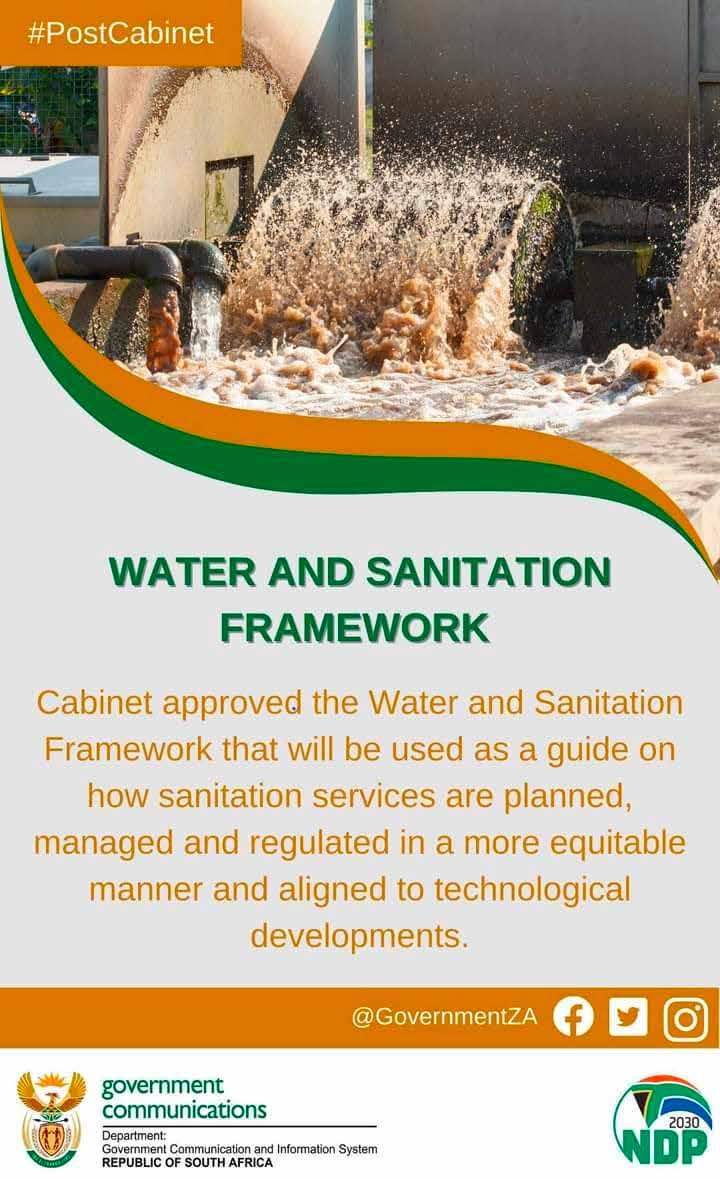
Holding the country’s purse strings can sometimes feel like a masterful act that requires immense dexterity.
That is if the Public Sector Manager’s (PSM) recent conversation with the Acting Director-General (ADG) of the National Treasury, Ismail Momoniat, is anything to go by.
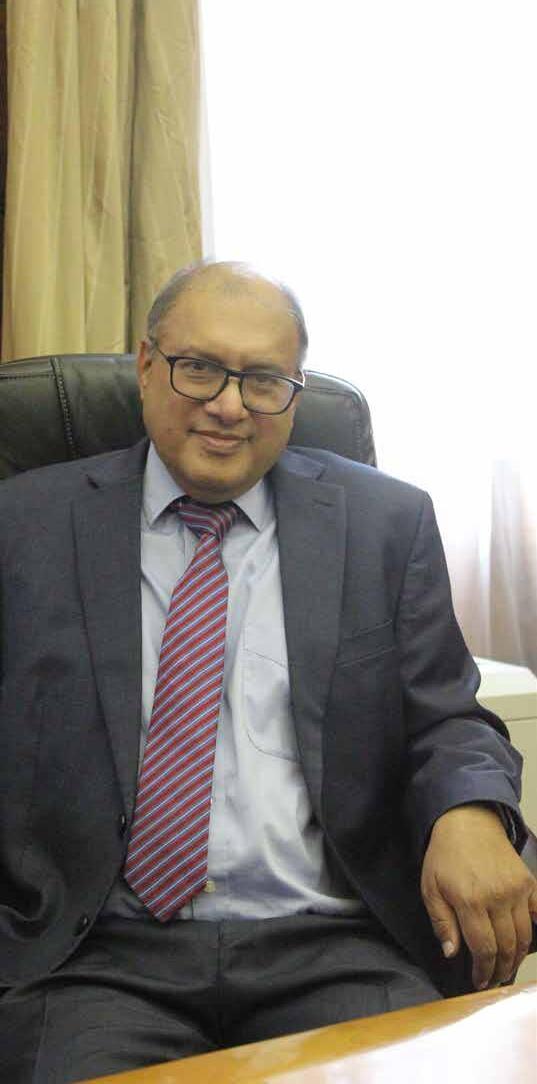
In a candid wide-ranging interview, the veteran of 28 years at 40 Church Square, lays out in intimate detail the economic and financial quagmire the country is attempting to extricate itself from.
The quandaries range from the debilitating stages of load shedding, the recent grey listing by the Financial Action Task Force (FATF), corruption and soaring debt levels.
All these featured prominently when Finance Minister Enoch Godongwana delivered the 2023 Budget in February 2023.
Chapter 13 of the Constitution of the Republic of South Africa, 1996 mandates National Treasury to ensure transparen-
cy, accountability and sound financial controls in the management of public finances.
While the country’s economic growth prospects were, over the past decade, stunted by a myriad of ill-fated events, inroads have been made in recent years to reverse the losses.
“This year, government will achieve a main budget primary surplus – meaning that revenue exceeds non-interest spending – for the first time since 2008/09. Next year, the consolidated budget deficit will narrow to 4% of [gross domestic product] GDP – the lowest since 2019/20,” Momoniat wrote in the 2023 Budget Review.
Expanding on this to PSM, he said National Treasury achieved this by being “really disciplined” on expenditure growth “without getting to austerity”.
“It is a challenge on the finance side because we actually need to spend less
than what we raise as revenue and not be borrowing for our debt-servicing needs. And in fact, if you see debt servicing (costs), it is projected now to be our largest spending item,” he elaborated.
Momoniat warned that if government does not stabilise this expenditure item, “debt-to-GDP will continue to increase”.
“How we stabilise is what the markets watch. It is an important indicator of our financial health,” he added.
With many government departments and entities not growing anywhere near what they should be, Momoniat emphasised that achieving this had been “quite an achievement” that involved trade-offs.
He explained that a large causal factor of this predicament was government tending to spend more on recurring expenses, such as public servant wages, rather than growth enhancing expenditure, such infrastructure projects and maintenance.
Along the way, National Treasury has had to be at the fiscal forefront of fending off curveballs thrown in government’s direction. Significant headwinds arose in the form of the COVID-19 pandemic. This was followed by the July 2021 civil unrest in KwaZulu-Natal and
parts of Gauteng. KwaZuluNatal was again the scene when devastating floods struck in April 2022. The latter two events claimed hundreds of lives and left a trail of infrastructure damage amounting to billions of Rand that required government intervention.
Matters were, in March 2023, compounded when the GDP for the last three months of 2022 revealed that the country’s economy shrunk by a staggering 1.6% during this period. The three months coincided with unprecedented levels of power outages.
“The issue of power cuts is absolutely urgent and by far the most important objective, not just for [National] Treasury but for the whole of government and the economy,” he explained.
Reflecting on this, Momoniat said: “We are going to be shrinking as an economy because many economic activities [if they] don’t have electricity, they won’t be able to function.”
Dealing with load shedding, he reiterated, was “by far the most important obstacle that government was currently seized with.”
“It affects everything; whether we are able to produce; whether we are able to trade; whether people have jobs People suffer. Everything gets disrupted,” said Momoniat.
With President Cyril Ramapho -
sa and Minister Godongwana dedicating significant portions of the State of the Nation Address (SoNA) and the Budget, respectively, to address the energy crisis, the magnitude of the emergency is not lost on government.
President Ramaphosa described the energy crisis as “an existential threat” to the country’s economy and social fabric. Chief among the interventions was the appointment of the Electricity Minister in March 2023.
“Fixing Eskom is only part of the problem. Electricity doesn’t equal Eskom,” said Momoniat. “Let’s get electricity – which you can get within Eskom but also outside of Eskom – but we spend time on fixing Eskom. They need to run the power plants better, even as they plan for the future. Two; we are making big structural forms in the electricity sector by splitting transmission, generation and distribution.”
In the Budget presentation, National Treasury proposed to provide the country’s embattled power utility with R254 billion in debt relief over the next three years. Of this, R168 billion will be in capital while R86 billion will be in interest.
“Eskom as an institution has no capacity to raise funds from the market when it wants more money to buy diesel, they can’t borrow. What we had to do
was to at least get Eskom in a healthy financial shape to be able to borrow and operate financially,” Momoniat explained.
Momoniat believes that the economy is resilient enough to withstand future pressures.
“Some of the issues, like floods, are related to climate change and I think that all countries need to prepare for the eventuality of more [natural] disasters that we will have to deal with. The other challenges are more political, he said.
“If the economy doesn’t grow; there will be more and more potential for unrest. How do we deal with it? Well, by firstly saying, fiscally we will be stable. It’s not as much of a money problem.
“When you look at the floods, our problem is corruption has become so entrenched in South Africa that it becomes more of ‘how do we deal with the damage of the floods? How quickly do you repair the infrastructure? Can you make sure that the money is not stolen? Can we make sure that there is urgent support for the families that get displaced and how you help them?’ Then there are less urgent issues that are equally important. Can the bridges and roads repaired, etc.,” he said.
The ADG is of the view that some of the challenges could be avoided by having functional and proactive systems in place.
“It is about making the state agile so we can respond quicker and more efficiently on one hand. When it comes to something like the insurrection; that too reflected a lot of other failures like that our police system wasn’t working. The police couldn’t defend the communities, those people whose shops were looted, they couldn’t protect their communities”.
He attributed the dysfunctional state of some government departments and agencies to the years of State Capture.
“They weakened the police, they weakened the prosecuting agencies. By the way, that led to things like grey listing. Our institutions were broken. The performance is not up to standards expected internationally,” he said.
In this regard, while the phenomenon reached its worst point in 2018, “corruption certainly didn’t stop,” he decried.
While malfeasance was “systematic” under state capture, it was more a question of brazen syndicates daring to be caught.
In February 2023, the FATF placed the country on the grey list for falling short of certain
international standards for the combating of money laundering and other serious financial crimes – a development National Treasury was anticipating.

“We tried very hard to prevent it. We really succeeded in reducing the number of action steps from like 67 recommended action steps to about eight,” Momoniat revealed. “We knew we were going to fail but we were trying to reduce the number of things that we still needed to continue with. We think we can succeed in dealing with in about one or one-and-a-half years”.
While he feels the task was a tall order, he is confident that the objective is attainable.
“Some of the things, like our capability to get more investigations, more prosecutions etc., is going to be a challenge,” he conceded.
He reiterated the importance
of the country illustrating that there were consequences for corruption, saying this was in the interest South Africa.
Despite being at National Treasury for almost three decades, Momoniat has no plans of slowing down.
“We’ve changed things for the better; the country is on a higher economic growth; succeeded in reducing poverty; to have empowered more people”.
From a governmental perspective, he is confident that institutions are working well and are better placed to meet future challenges.
Government is, however, in the process clawing back losses, adding that more needs to be done to ensure that the country keeps up with the ever-changing financial sector.
“I don’t like to think back on what we’ve achieved and be
happy... What worked before may not work today. The question is: how do we continuously improve the way things work?”.
One of the things Momoniat is proud of is that they have managed to empower and build a team of younger leaders to take National Treasury into the future.
“I feel proud that I’ve been part of a process [where we grew our] own talent within the organisation. I’m really proud of my colleagues who are much younger than me and who are going to lead into the future,” he said.
Despite this, he said challenges were much harder than the challenges the initial post-1994 National Treasury had to contend with.
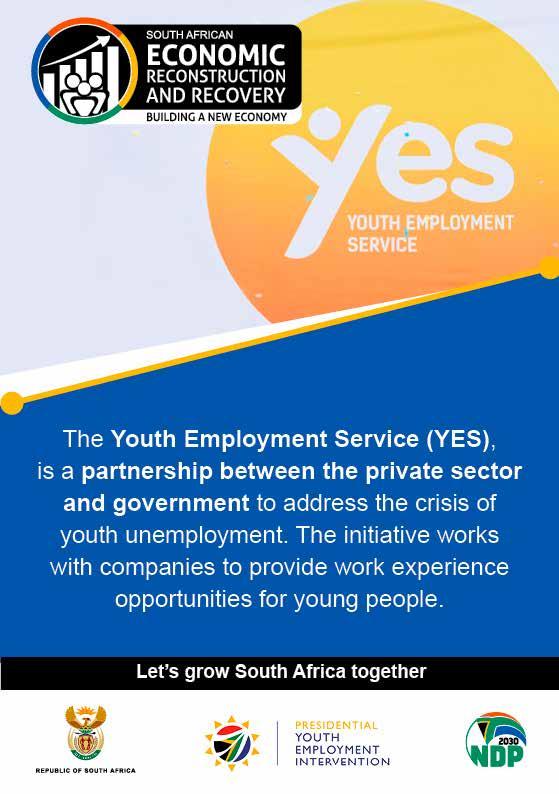

Chief Executive Officer (CEO) of the Food and Beverages Manufacturing Sector Education and Training Authority (FoodBev SETA), Nokuthula Selamolela, is on a mission to transform the male-dominated food and beverages manufacturing sector – to ensure that women enjoy the fruits of equality.
The FoodBev SETA is one of the 21 SETAs across the South African economy that are mandated to put the National Skills Development Strategy into practice. It promotes, facilitates and stimulates skills development in the food and beverages manufacturing sector.
“We are in the middle of the food and beverages value chain... between the agricultural input and the retail side. Our core focus is to facilitate training in the food and beverage manufacturing space,” she explains.
Since her appointment as
CEO in 2018, Selamolela took a conscious decision to empower women in the sector. This came after realising that the majority of manufacturers in the sector were male, while women were not well represented.
She believes that for the sector to be transformed, it has to start within the SETA.
“We could not have a male-led SETA that needs to transform the male-dominated sector. I had to ensure that more women get opportunities and that at least 50% of our board members are women. This is not because we do not care about men, but we are just creating equal opportunities for women,” says Selamolela.
As a result, the SETA is now women-led with the majority of employees being women, and Selamolela is proud to have achieved that in less than five years.
Selamolela’s transformative efforts were recognised during the 2022 Standard Bank Top Women Awards when she got nominated for the Top Women Leader in the Public Sector and Top Gender-Empowered Organisation in the Public Sector categories. She won the latter.
“It meant a lot to me and my team because I would not have achieved this without the team that I lead. It showed that nothing is impossible, especially for a woman like me who grew up in Umlazi Township in KwaZuluNatal where there were not many opportunities for women and girls in the past decades,” says the CEO.
She adds that being recognised by Standard Bank is special to the SETA because it intends to become a global brand.
“Most of the big companies in
our sector are multinational, so they need to understand who we are and what we can do for them. We have about 500 companies that are large, about 300 to 400 that are medium, and about 92% of our companies are small businesses,” she says.
The big companies in the sector include Coca-Cola Beverages South Africa, Tiger Brands Limited and the Parmalat Group.
Selamolela joined the authority in 2013 as the Chief Financial Officer (CFO) and was immediately appointed as the Acting CEO.
“I really had no aspirations of becoming the CEO of the SETA at the time. A new CEO was appointed in 2014 but did not stay long in the position. I was again appointed as the Acting CEO from 2014 to 2018 before
my appointment as the CEO,” she explains.
Her career started as an Assistant Accountant at Tongaat Hulett. She then completed her articles at Vodacom, and moved to the Independent Communications Authority of South Africa to work as a Senior Finance Manager. She was later appointed as the CFO at Swiftnet.
“I started working at the age of 21 years. I got tired and decided to take a break because I felt like I had been working forever.
I then became a consultant after resigning from Swiftnet. Throughout my career, I built networks and many people called me to assist their companies with advisory services,” she says.
She decided to get back to the job market in 2013, when government introduced cost containment measures because getting clients for her consultancy work was becoming difficult.
“When I joined the SETA, all the managers had left for
whatever reason and it was only myself, the Senior Specialist and everyone else was acting. It was just too much for me, and the public sector was not really my thing at the time. So, I did not want to stay,” she explains.
Ten years later, and now at the helm of the authority, Selamolela’s passion about improving people’s lives rather than chasing profits in the private sector is keeping her going.
Just like her wealth of working experience, her educational background puts her at an advantage of leading the SETA. She obtained a Bachelor of Commerce (BCom) in Accounting from the North-West University and a BCom Honours in Accounting from the University of KwaZulu-Natal.
She completed her Master’s in Development Finance from the Graduate School of Business, University of Cape Town, and recently completed a Senior Executive Programme Africa with Harvard University.
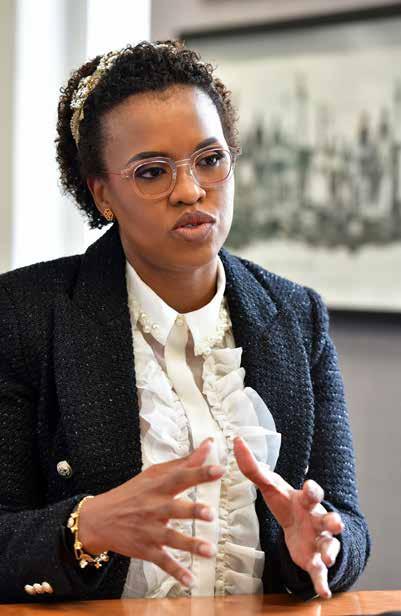
“Basically, my role as the CEO is to strategically lead the organisation. We develop a five-year strategic plan that envisions where we want to see ourselves at the end of the term, and in those five years, we have got
different outputs that cut across different programmes, and that emanates from our sector skills plan, where we find out what our priorities are and add them to our strategic plan, and then we implement them in the Annual Performance Plan,” she explains. She is entrusted with ensuring that her team of executives deliver on the strategy. Selamolela says the SETA has about 80 employees and mainly operates from the head office.
“We have satellites in three TVET (Technical and Vocational Education and Training) colleges and we are planning to open three more during this new financial year. We do not have branches in other provinces because technology also enables us to engage with our stakeholders anywhere in the world. The majority of our stakeholders are concentrated in the Western Cape and Gauteng, followed by KwaZulu-Natal, mainly because these are the hubs of manufacturing,” explains Selamolela.
The CEO’s wish is to leave behind a legacy of empowering people through different skills, including ensuring that women are ready to be future leaders, enabling youth to get in the industry and to ensure that she leaves the SETA better than it was when she joined it.

To build public confidence the City of Ekurhuleni, the metro’s Group Chief Financial Officer (GCFO) Kagiso Lerutla’s top priority is to achieve clean audits.

At the time of his appointment, about four years ago, Lerutla made headlines as the youngest GCFO in the city at the age of 33. He grabbed the opportunity and proved that young people can become great leaders when given an opportunity.
Through his leadership and hard work, the city has been achieving clean audit reports since 2020/21. In 2021/22, Ekurhuleni was the only metro in Gauteng to achieve a clean audit, reporting zero wasteful, ir regular and fruitless expenditure.
“All we have been asking for as young people are opportunities. When I got appointed into this position, I told myself that I will and my track record, as a profes- four divisions, including supply revenue.
“Because I want to transfer the leadership skills that I possess, I always look for ways to empower the heads of divisions that report to me so that they can become future GCFOs. My team is mostly led by young people, and one of the divisions' head is younger than me. I believe that young people should be given a chance to lead because they are capable,” he says.
He gives all heads of divisions an opportunity to practise their knowledge and leadership skills by ensuring that they act as GCFOs and always encourages them to have an overall understanding of how the organisation works.
Lerutla explains that his secret in fighting corruption, fraud and maladministration is inclusive and integrated reporting.
“I always make sure that the city uses money for what has been budgeted for. When we get clean audits and deliver the best
service to our residents, the city is able to attract more investors and increase employment opportunities for locals through the projects and programmes that we initiate,” he adds.
In the last financial year, the city had a budget of R50 billion and he says approximately the same amount will be budgeted for the 2023/24 financial year.
With his exceptional financial management skills and dedication to transparency, Lerutla’s story serves as a great inspiration to young and upcoming public finance professionals and students alike. In a time where financial scandals and mismanagement run rampant in local government, his story is a refreshing testimony to integrity in the Public Service.
His hard work led to his nomination for the 2022 CFO Awards.
“This was a great achievement for me. It validated me and showed that a lot of things can be achieved if one works hard. It also attest to the fact that young
people are capable of excelling in leadership positions,” he says.
The young GCFO believes that for local government to regain confidence and trust from the public, government should be professionalised and that people with the right qualifications must be hired and be given opportunities regardless of their race, gender and age.
His advice to public servants, especially those at local-government level, is that they should always remember that they work for the people of South Africa.
“We should not forget where we come from as a country. We are here to serve and we must always give our best. If we forget where we come from, we can easily lose all that we have built in the past three decades,” he says.
“We must always be guided by the Batho Pele principles. We must be service-delivery oriented. Whether people are watching or not, you must always do your best to deliver,” he adds.
Lerutla keeps himself abreast of industry standards by par-
ticipating in various professional forums, including the Chief Financial Officers’ Forum and the Finance MEC Forum in Gauteng.
Born and raised in Sekhukhune, Limpopo, he attributes his success and motivation to his background and education.
He obtained a Bachelor of Commerce (BCom) from the University of Limpopo in 2008 and a BCom Accounting Honours degree from the University of Johannesburg in 2009.
He acquired his training and articles to qualify as a chartered accountant from the AuditorGeneral of South Africa, before joining the company as an assistant audit manager. In 2013, Lerutla became a member of the South African Institute of Chartered Accountants.
He joined the City of Ekurhuleni in 2014 as a divisional head of governance and compliance within the finance department. He was appointed to his current position in May 2019.
“When I got appointed into this position, I told myself that I will set the best example to show that it is possible to become a leader while you are still young, and my track record, as a professional, shows exactly that”.
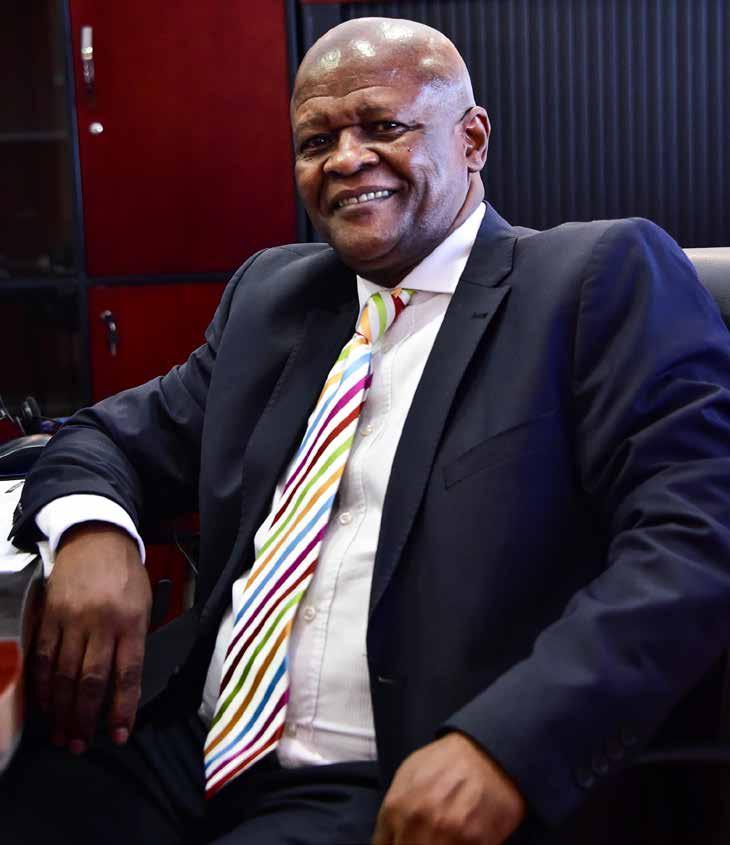
Tasked to monitor and enforce compliance by public and private bodies with the provisions of the Promotion of Access to Information (PAIA) Act, 2000 (Act 2 of 2000), and the Protection of Personal Information (POPI) Act 2013 (Act 4 of 2013), the Chief Executive Officer (CEO) of the Information Regulator, Mosalanyane Mosala’s leadership epitomises the principles of Batho Pele.
He exudes passion when he speaks of his tenure at the helm of a regulator steadily finding its feet.
While the Information Act was promulgated in 2013, the organisation was first established in 2016.
Intermittent Acting CEO stints between 2017 and 2021 saw Mosala dig the trenches to lay the institution’s foundation. The regulator only became operational in July 2021. The secondments were to to assist in establishing the administration of the regulator and provide strategic leadership.
Mosala has worked in the Public Service for over 38 years. Of these, 13 were as a Chief Director at the Department of Justice and Constitutional Development.
A trained educator, the technocrat has 17 years’ experience at local government level, which enhanced his problem-
solving abilities at a coalface level.
The Bloemfontein native holds a Bachelor of Arts degree, majoring in Education and English, a Bachelor of Education Honours degree, a Master of Education degree and a Magister in Public Administration degree.
His firm roots on the Batho Pele principles were strengthened by his involvement in exercises like adjudicating the
sation, Mosala has no desires of resting on his laurels.
In the 2021/22 financial year, the regulator approved its first organisational structure, consisting of 378 positions.
Mosala said, through this process, 95% of organisation positions had been filled.
“We will be closing the other 5% in the new financial year,” he said.
While these were still not enough, they would be sufficient in the interim, he explained.
The question of resources, for
direct marketer calls, security compromises and unsuccessful PAIA of 2000 applications.
On the POPI Act of 2013, the CEO said the level of adherence was at different levels.
“There is an obligation on organisations to comply. We have a portal where people register. But we are worried that the compliance is not being measured. We need to begin to measure whether everyone that is supposed to register, is registered. Those who have sent requests for registration, we have processed all of them,” he said.
However, the regulator is unable to determine the level of compliance.
National Batho Pele Excellence Awards and the KwaZulu-Natal Premier's Service Excellence Awards.
Between 2016 and 2020, he was the National Chairperson of the Batho Pele Excellence Awards.
The Information Regulator issues codes of conduct for different sectors and makes guidelines to assist bodies with the development and application of codes of conduct.
Despite expected teething problems of a fledgling organi-
him, is not much of an issue.
“You can have money and people but not perform. It’s about how you turn those into efficiencies,” he said.
With significant progresses recorded in the operations of the POPI Act of 2013, attention was swiftly being rerouted to the enforcement of the respective laws.
In this regard, Mosala said the organisation’s case load was largely seized by complaints of the public being bombarded by unsolicited
“We don’t know what is that number visa vie those who are supposed to be [registered]. We may have put in place provisions for people to comply voluntarily but we need to begin to go to the next level.”
This will require the regulator to proactively determine the amount of public and private organisations that should be compliant.
“There is a request that if you process personal information of a special type, you need to ask for prior authorisation to process it. You have to request that from us. If you do not, you
“You can have money and people but not perform. It’s about how you turn those into efficiencies.”
can’t process that personal information,” Mosala said.
The regulator follows a strict methodology when processing requests. For institutions that self-regulate, like banks, the regulator goes through the codes of conduct before granting or rejecting an application.
Mosala explained that it can take up to two years for the regulator to approve an application for a code of conduct and that applying for one does not warrant an approval.
“We decline, we don’t just accept upon application. These [institutions] will be acting on our behalf in whatever they do,” he said.
To this end, the regulator has granted permission to the Banking Association of South Africa and the Credit Bureau Association. This, however, was after several application rejections.
“We have instances where we have rejected applications. All these have their own processes,” adding that they had to be strict from the onset to ensure a clear process.
“We act without fear or favour. We will investigate requests for information on behalf of the public. [For example] the music industry
complained that musicians [whose] music is played on TV and radio [needed] to be paid, but there was no transparency.
This prompted the regulator held public hearings with all affected parties and a report was being processed.
“I have said to the colleagues in the regulator that if we are going to deal with this theoretically, people will complain that we don’t have a clear impact,” Mosala said.
Biggest achievement is to begin to take the two pieces of legislation to the public and “make them real”, he insists.
Among those recently in the crosshairs of the regulator was the Department of Basic Education (DBE) on the publishing of matric results without the consent of learners or parents or guardians
“We challenged them [DBE] in the first year, they managed to get a court order with some interested party. In the second [year)], we insisted that [they] needed to issue a consent form to parents [to grant permission on] whether results can be published or not,” he said.
“These two pieces of legislation will not mean much if they do not impact the lives of South Africans,” he main-
tained. “We are working with them to improve that.”
In its first year of operation, the regulator received 544 complaints relating to the POPI Act of 2013. According to the organisation’s annual report, 229 were investigated and finalised.
“We are beginning to increase the [response and turnaround] time. Obviously there are complex cases that we don’t improve overtime,” he said.
Mosala explained that to address deficiencies in the system, the regulator was tightening its processes.
“We did the assessment of municipalities in this financial year and the level of compliance there is not good,” he said.
An assessment of the banking sector fared better. The regulators is currently assessing regulatory institutions, including Mosala’s organisation.
“We are being proactive to push [the level of compliance],” he said.
With his term of office ending in 2026, Mosala has a clear set
of goals he wants to achieve when the time comes.
“I want an efficient administration by the time I leave here. For me efficiency doesn’t mean more money, more people. It means that we can achieve [more with less],” he said.
The CEO has already developed a set pillars geared towards achieving this.
“I call this a plane with six engines. The first engine is leadership. I want to leave this organisation with capable leaders at all levels”.
This, he said, means ethical leadership with clear direction.
“The second engine is planning. If you don’t plan, you’re haphazard. You come to work but you don’t know where to start. This way you avoid unfunded mandates,” he said.
Thirdly, he said, it was also important for the organisation to have suitable processes in place.
“I want to us to be a resultsbased organisation. These results must [lead us] to outcomes. We must not just say ‘we had 100 people who complained and we resolved 90%’. We must determine what those complaints are. How are they impacting on people’s lives?”
What is self-service?
It is an online system whereby end-user(s) can access certain GEPF information themselves or select certain services that they want to use. It is designed to be viewable on computers smart phones and tablets from anywhere and at anytime.
What is GEPF self-service?


The GEPF Self-Service system has been developed to ensure ease of business when engaging online with the GEPF. It allows for members of the Fund to access and update their information as well as track their pension or other related benefit claims
What services are available on GEPF self-service?
When accessing GEPF self-service portal, members will be able to:
• Access their benefit statements
• Access tax certificates
• Trace claims and retirement benefits
• Update contact information
• Nominate or update beneficiaries
• Access personalised correspondence like letters and newsletters
• Access latest notices from the GEPF


What are the benefits of having GEPF self-service?
•
You are able to engage with the GEPF from anywhere No need to travel to a Walk-in Centre, contact the
Why is a member not allowed to change marital status, First names. Surname, Initials, Maiden name on self-selvice Web or App?
Marital status, First Names, Surname, Initials, Maiden name are automatically derived from South African Home Affairs department particularly for a member with a valid South African ID number. However; should any of the above information be incorrect, a member is requested to go to Home Affairs Department to correct the information.
What is an OTP?
An OTP is an abbreviation for One Time Pin that is often send to the user in a way to authenticate and validate them every time they update any form of data/information on Self-Service. E.g. updating or nominating of beneficiaries
What is ECTA or ETA?


ECTA or ETA is an Electronic Communications and Transactions Act 25 of 2002, to provide for the facilitation and regulation of electronic communications and transactions; and many more.
Call Centre or wait for your documents to arrive by post.
•
•
•
You can check your personal details and update them anytime.
You can access self-service using any smart device with an Internet connection and it's accessible anytime and anywhere in the world. Self-service saves you time and effort - no more standing in long queues or waiting to be assisted by a Call Centre agent.
Are there any special requirements I need before I start using self-service?
There's minimum requirement in order to register for Self-Service. Members, Pensioners and Beneficiaries are required to sign up for the service using their valid SA Identification Document or Foreign Passport, Cellphone number and a valid e-mail address. This will allow the system to authenticate you the user. You can further register through GEPF Self-Service Web and/or Mobile App.
How Secure is self-service?


The data that is viewed is data the GEPF has which was either provided by yourself or your employer. The portal simply shows the data that GEPF has. The data is not stored by any external party. Access to data is through the member's credentials and the member needs to keep his/her password safe. Members can
change the password at anytime if they want to.
I am registered for self-service and will be traveling abroad; will I be able to use selfservice from abroad?
Yes, self-service is available to you from anywhere.
Whom do I contact if I have any queries?
Contact the GEPF self-service number at 012 319 use this number only for self-service queries or email us at selfservicesupport@gpaa.gov.za
1400
If you unable to register and you see the following message,"Your information is invalid and does not match our records."
There are few options that you can try to resolve the problem;
• Try again and make sure you have typed the correct required details.
•
This document outline the use of the OTP and the terms and conditions that binds GEPF and the User (Member or Pensioner)
See the link below for ease of reference: -http://www.gov.za/documents/electroniccommunications-and-transactions-atc#
What happens if a member does not receive the OTP?
• There could be potential network coverage issues, which a member needs to check on their device, or GEPF server is not available at the time of use thereby affecting the availability of Self-Service Web or App. Alternatively, the member should try again later or click on 'resend'.
What is the Temporary Password and how do I receive one?
A Temporary Password is a system generated password (which is case sensitive) that can only be used once by the user during the registration period. Furthermore, the password is sent to the
•
Make use of the registration Auto Questionnaire in the event that your RSA ID/ Foreign passport or cell phone number and or email address does not match our records, you may proceed to follow our authentication process which requires you to answer some questions and proceed to change your personal details upon completion. If all of the above fails, please send an e-mail to selfservicesupport@gpaa.gov.za to assist you.
user by means of an SMS or email. Therefore, if you don't receive an SMS, you can also check your emails. Alternatively, you can click on 'Resend'.
What could be the reason if my password is rejected?


Your password can be rejected if its not created according to accepted password rules or minimum requirements. E.g: Your password may be too short or does not contain special characters or digits. See minimum password requirements below for the GEPF self-service Web or App:

Many young people in South Africa find it difficult to get jobs because they don’t have any work experience. They come out of school, university or college with qualifications, but many employers are looking for people with experience.
That is why, in 2018, we launched the Youth Employment Service (YES), an ambitious partnership with the private sector to address the crisis of youth unemployment. The initiative works with companies to provide work experience opportunities for young people.
Five years later, the YES programme is helping to reduce youth unemployment in very practical ways.
To date, YES has placed over 100 000 South Africans between the ages of 18
and 29 in local businesses for a year of work experience.
Through YES, approximately R6 billion in youth salaries has been injected into the economy and has enabled participants to support their families.
The YES programme is part of the
broader Presidential Youth Employment Intervention, which is government’s flagship initiative to respond to youth unemployment. It includes a range of programmes to help young South Africans transition from learning to earning.
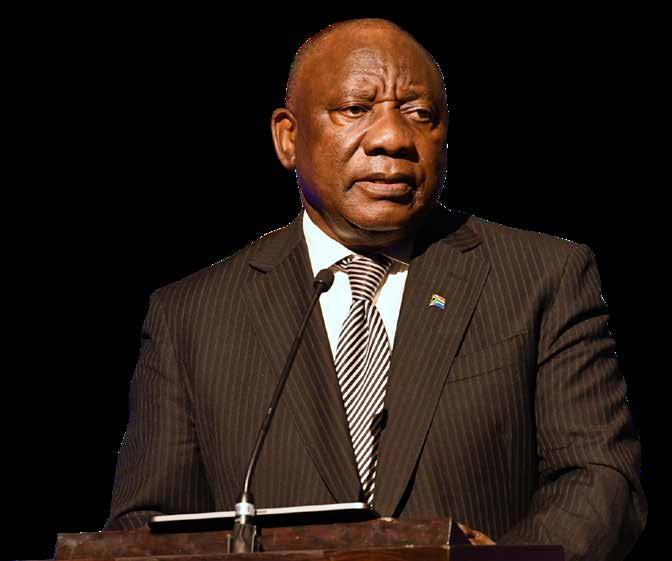
Among these programmes
is SAYouth.mobi, a zero-rated mobile platform where young people can access opportunities and support. Over four million young people have already registered on the platform and many of the young people participating in YES were recruited through the platform.
An estimated 61% of YES participants come from households reliant on social grants. One participant, who was placed with Mercedes Benz for a year, was the sole breadwinner for a family of four. She told YES that not only was she able to support her family, she was also able to save up to start a broiler chicken business.
Many young people have been placed in future-facing industries such as information technology (IT), the green economy, systems and software engineering, app development and others.
In addition to facilitat-
ing work experience, YES also operates several training hubs across the country.
One of the YES participants was placed at the Drone Academy, a hub in Alexandra township in Gauteng that offers training in the maintenance, repair, servicing and operation of drones used for business. Having completed his training, he is now employed as a systems integration engineer with a leading Netherlands-based chip manufacturing firm.

Other hubs operated by YES offer training in IT, aquaponics and sustainable farming, culinary skills, textile manufacturing, ceramics and pottery, and automotive manufacturing.
According to research under-
taken by YES, an estimated 40% of participants are employed on completion of the programme.
One participant in the 2021 intake told YES how after completing the Multichoice Learnership Programme she went on to secure a permanent job with a multinational firm based in Gauteng.
In this year already, YES has achieved a new record of 32 400 jobs. Currently over 1 400 businesses participate in YES, and the aim is to increase the pace of placements as more companies come on board and more opportunities are made available.
What sets the YES programme apart is that it doesn’t just create meaningful jobs; it also creates
value for employers that are able to facilitate the entry of more young South Africans into the mainstream of the economy.
Government has put an enabling legislative environment in place to incentivise businesses to participate in youth employment creation. For example, both large and small qualifying enterprises can improve their Broad-Based Black Economic Empowerment status by participating in YES. In addition, the Employment Tax Incentive reduces the costs to companies of hiring young people.
We have always said that the unemployment crisis can only be overcome if all social partners come on board. As the main source of job creation and reten-
tion in most countries around the world, including our own, the private sector’s involvement is critical.
As government we will continue to play our part by putting in place regulatory and legislative tools to encourage business to hire more young South Africans.
Having reached this important milestone, we congratulate YES and its partners for offering a chance at a better life to 100 000 young people. We can expect to see these numbers increase in the months and years ahead. I call on more businesses to become part of this life-changing programme and to contribute to the recovery and reconstruction of our economy and society.
Human Settlements Minister Mmamoloko Kubayi says from 1 April 2023, the
department will take over the implementation of the Emergency Housing Programme.
Emergency Housing Grant come to an end. It will also result in the department being able to
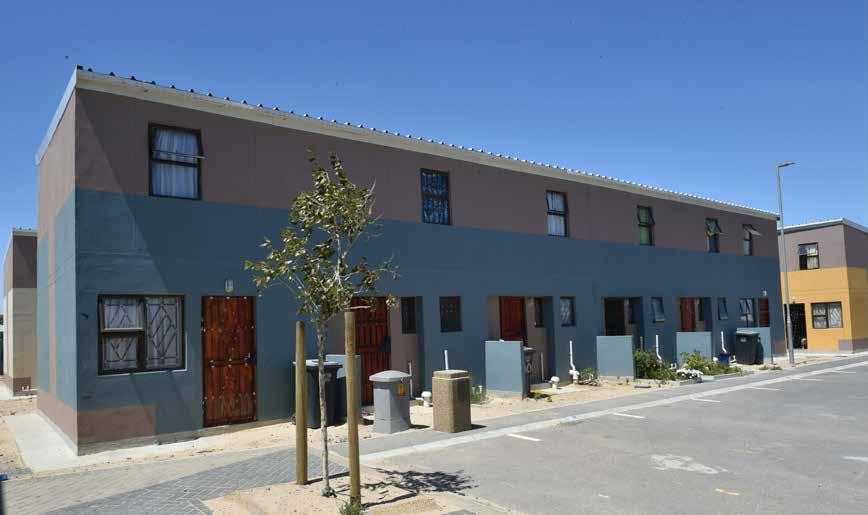
respond faster to assist those affected by disasters.
Announcing policy changes to accelerate performance in the housing sector, Minister Kubayi said the increase in the frequency of natural disasters and the severity of the devastation requires a human settlements disaster response that is swift and appropriate for alleviating the plight of the affected.
The Minister acknowledged that the department’s response has been “underwhelming and slow”, resulting in victims finding themselves without homes two to three years after disaster has struck.
“In some instances, people have been in temporary structures for more than 15 years when the policy says these structures must be replaced within six months,” Minister Kubayi said.
She attributed the inadequate response to long delays in applications for disaster grant funding from affected municipalities and provinces due to the lack of skills for assessment of disasters at a provincial and municipal levels; the dysfunctionality of municipalities due to political instability, and prolonged delays in land acquisition, which frustrates the
process of temporarily accommodating people.
“We also realise that the method of the allocation of funds amongst the provinces was suboptimal, as some provinces are more prone to disasters than others,” she said.
Working with National Treasury, the Minister said that the department has determined that the response to disasters will be more effective when managed at a national level.
“This also means that emergency funds will be available for deployment to the affected areas at the time of need, rather than being appropriated to a province or municipality that does not experience a disaster during the financial year.
“We believe that this approach will enhance collaborative planning amongst the three spheres of government, in anticipation of disasters and simplify the response so that we optimise funds allocation across the country and improve the response time,” said Minister Kubayi.
However, Kubayi emphasised that provinces and municipalities are expected to ensure that they still attend to all outstanding households, whose properties were destroyed in previous disasters and are yet to receive
assistance, despite the municipalities and provinces having received funding for those disasters.
As part of implementing the emergency housing programme in the new financial year, the Minister said the Emergency Housing Command Centre has been established to coordinate the national disaster response.
“It will have linkages to the South African Weather Service and provide the ability to receive early warning alerts to enable the proactive mobilisation of resources to respond to imminent disaster.
“This will also link to the National Disaster Centre and will not work in a competitive or contradictory manner. This allows communities direct access to report incidents via email on EHR@dhs.gov.za,” the Minister explained.
In addition, a disaster management team, which combines and leverages the skills and capacity of the department and departmental entities, including the Housing Development Agency, National Home Builders Regulatory Council and the National Housing
Finance Corporation, has been created.
“A framework has been developed, which includes the definition of the roles and responsibilities, the implementation guidelines and the standard operating procedure. This team is ready to commence with the work on 1 April 2023.
“We have further decided that instead of providing Temporary Residential Units for disaster-affected households, we will introduce a permanent solution through alternative building technology, particularly in rural areas where mud houses often disintegrate during severe rainfall,” explained Minister Kubayi.
Other measures will include the provision of vouchers for affected households to enable them to build their own homes; the provision of building material for residents in informal settlements to rebuild in the same location or to relocate to safer land, working alongside social facilitators; and the provision of Transitional Emergency Accommodation, which could include using various identified vacant government buildings across the country that can be transformed into habitable environments. – SAnews.gov.za
Agrowing number of scientists is calling for a mindset shift about climate change, which draws from various knowledge systems, among them the adoption of practical wisdom in the fight against climate change.

Professor Coleen Vogel, from the Global Change Institute at the University of the Witwatersrand, has co-authored an internationally collaborative piece, with scientists proposing the adoption of practical wisdom in the fight against climate change. Practical wisdom is a useful approach when there are conflicting values, power inequalities, and knowledge gaps. According to Greek philosophers, practical wisdom is the central virtue of citizens involved in public and social life.
It is the capacity to navigate complex and contentious situations with will and skill. Practical wisdom is an ethical compass that aids decision-
making amid uncertain knowledge and conflict. Furthermore, wisdom enquiry suggests that the pursuit of wisdom is preferable to the pursuit of knowledge. This allows practitioners and researchers to find new and rational ways to address urgent challenges without relying on technical and positivistic ideas of rationality.
“In climate science, without a guiding principle, we may become mired in the complexity of competing ideas and contexts, which leads to paralysis. This is despite the best intentions to find timeous solutions to guide effective action,” explains Vogel.
The paper, titled Practical Wisdom and Virtue Ethics for Knowledge Co-production in Sustainability Science, is a radical attempt to outline how sustainability practitioners can co-produce knowledge where collaboration is held in the highest regard among all stakeholders. In the article, the authors
argue that engaging with practical wisdom and virtue ethics can enhance researchers’ capacity to foster transformative change.
“This approach is also focused on learning and reflexivity,” says Vogel.
The authors show how practical wisdom works when addressing real-world problems such as food systems in South Africa, biodiversity conservation on Mori indigenous land, green spaces in small German towns, and water pollution in Hungary. The Southern African Food Lab, for example, adopted the practical wisdom guiding principle in its Food Futures Scenario Project. It created and disseminated transformative stories about food system futures through interaction, communication and collaboration between different actors, including those with conflicting interests. When an activist criticised the dialogue process, lab participants responded in a way that
demonstrated their commitment to continued engagement rather than polarisation. All participants agreed to stay engaged and seek connection with one another to consider the solutions to hunger.
The authors propose that universities and research institutes embrace practical wisdom in their measurement of good quality science. They claim that, if research institutions want to be viable leaders in today’s world and fulfil their commitment to serving the public good, they need to invest more and become better in creating the conditions for cultivating practical wisdom. Practical wisdom can help universities to become powerful actors of change.
“We live in a time of multiple and interconnected crises. We are all in this together. Practical wisdom as a guiding tenet provides a way of dealing with complex challenges, now and in the future,” elaborates Vogel.
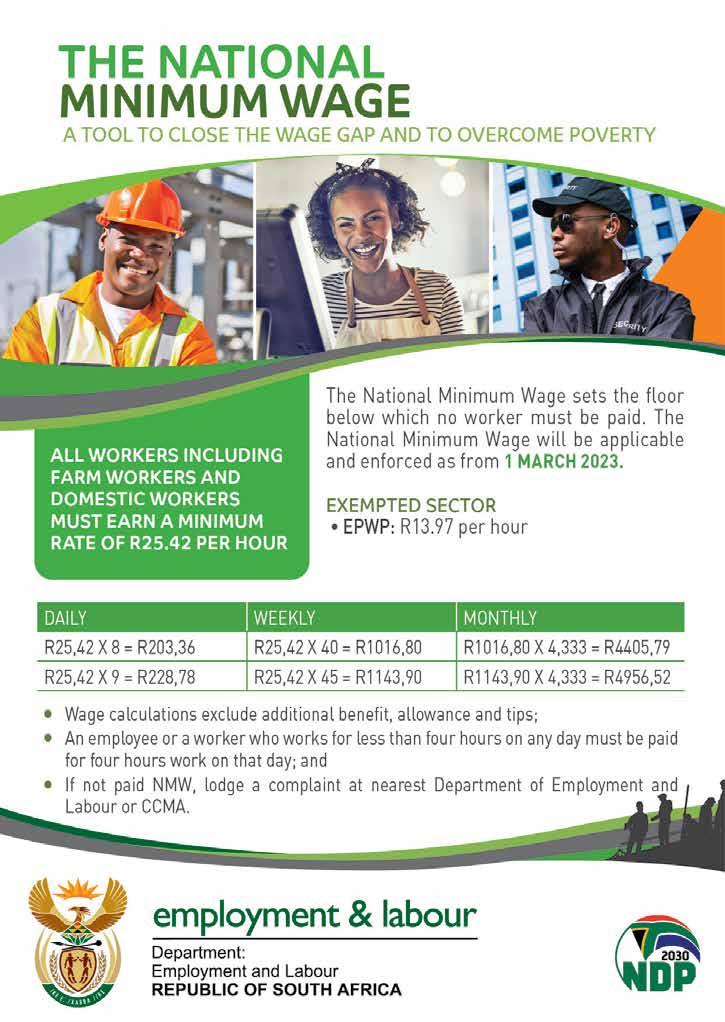 Writer: Kate Mlauzi and Dr Francina De Clercq;
Writer: Kate Mlauzi and Dr Francina De Clercq;
Cabinet recently approved the National Framework for the Professionalisation of the Public Service, which seeks to transform the Public Service to contribute to a professional, ethical and capable developmental state by focusing on, amongst others, ensuring there are competent
and skilled people driving service delivery.
As government moves to introduce and reinforce various measures to professionalise the sector, it might be an opportune time to reflect on how the Public Service currently assesses whether public servants are
competent and are performing in line with specific behaviours linked to their roles and functions.
There are a range of interventions which seek to manage performance and ensure individuals have the competencies required to perform. In order to
understand how competencies are measured and managed, the University of Witwatersrand’s Centre for Researching Education and Labour (Wits REAL) conducted research to understand how competency frameworks (CFs) are conceptualised, used and applied to improve the

performance of the Public Service. What emerges from a review of the existing four CFs (the senior management services, the middle management services, the monitoring and evaluation and the financial management competency frameworks) is that these frameworks, which are intended to set standards for performance so that individuals are assessed but also which are used as a tool for recruitment, selection, developing and managing the performance of human capital so as to be a performing organisation, are not being used as intended. The research was done on behalf of the Public Service Sector Education and Training Authority.
In essence, whilst CFs are supposed to help develop the human resource (HR) value chain, what is happening in reality is something very different. The reason for this does not lie necessarily in the frameworks themselves but the context and environment in which they are supposed to be implemented. Ultimately, if a CF is not located in an enabling and conducive environment, the framework on its own will not achieve its intended purpose. In other words, it is extremely difficult to build and exercise competencies in a space where people are not
encouraged to learn and make mistakes and where incompetent and corrupt officials are allowed to retain their positions – ultimately, creating a culture and climate of chaos.
So, let us delve a bit deeper to understand what CFs are intended to achieve. A CF is effectively a model that describes performance excellence within an organisation. Such a framework usually includes a number of competencies that are applied to multiple occupational roles within the organisation and mainly management roles. Each framework sets out and defines individual competencies required by an organisation in order meet performance standards.
So, effectively, a CF is a way for the Public Service to communicate which behaviours are required, valued, recognised and rewarded with respect to specific leadership and management occupational roles. They are also used to identify skills, knowledge, behaviours and abilities needed to meet cur-
rent and future talent selection needs, depending on organisational strategy, priorities and performance. In addition, they are used to develop individual and group development plans which lead to the bridging of the gap between the skills the organisation needs to work with and the skills available. So, for example, in the Public Service, most leadership and management CFs use a combination of core, generic and process competencies while others (such as the finance management CF) rely more explicitly on technical competencies.
A major problem with leadership and management competencies is that the ‘knowledge’ dimension is never properly and clearly conceptualised nor rooted in any specialised body of knowledge. Yet, if leaders and managers in a department do not have some grounding in a specialised body of knowledge related to their sector, they are unlikely to ef-
fectively assume their roles. This omission on what ‘knowledge’ entails limits the advantages of individual competences and CFs in improving public service delivery.
A second area of concern is that if CFs are supposed to be used for HR functions and the HR value chain, individual competencies should be easy to assess, measure and apply. What emerges in the research is that CFs are mainly used for competency assessment aimed, not at selection and recruitment but, at development and training as well as performance management (even if little consequence management occurs). There is also a lack of full ownership (whilst capacity varies) of these CFs among many departments which treat them as yet another exercise in bureaucratic compliance.
Some departments are more proactive than others in developing more detailed and specific CFs to strengthen their HR functions while, in other departments, the CFs may not lead to
“A major problem with leadership and management competencies is that the ‘knowledge’ dimension is neither properly and clearly conceptualised nor rooted in any specialised body of knowledge.”
the identification of appropriate and effective training courses nor to an effective performance management process. In that sense, CFs are only to a limited degree aligned with and contributing to the competency requirements for public service leadership in a developmental state.

What also emerges very strongly from the research is the fact that there is limited space for individual agency or for individuals to show what they can and cannot do. This is a result of the fact that current work organisations, organisational structures, culture, political stability and leadership are often inadequate and mitigate against individuals actually performing. This is also the result of the fact that many senior and middle managers are reluctant to adopt managerialist structures and processes which decentralise or devolve decision-
making by giving greater authority and responsibility to units, divisions or department, which require greater leadership and management agency. Instead, many senior managers prefer to operate in the safe rule-bound bureaucratic mould, which does not call on their critical thinking, problem-solving or actually making decisions to effect change.
What does this all mean then for building a capable, competent and ethical state? The research calls for a new ideological mind shift and ways of working, which focus on the citizens of the country and this will also require changes in organisational arrangements, structures, cultures, leadership as well as different CFs.
CFs should transcend intraorganisational and sectoral
boundaries and embrace group dynamics, institutional dynamics, social regulation structures and feedback mechanisms. Greater collaboration, networks and partnerships between various departments and organs of civil society are also required to implement the developmental objectives of the State. CFs should, therefore, move away from static competencies into dynamic competencies with an effective form of collective leadership capable and committed to learn continuously and renew itself.
The research also notes that CFs on their own cannot be seen separately from their current organisational and broader environment, which will impact on what they can or not do. They cannot be used optimistically as the main drivers or starting point for promoting these changes in the Public Service structures
and culture as they are embedded in the existing structures and environment. With the right supportive leadership and a strong knowledge base, departments that are focused on collective leadership should be given the space and autonomy to pilot new approaches, which could then be replicated across other departments. There is a danger in failing to explore new organisational approaches and a paradigm shift in terms of thinking dynamically about how to measure and monitor competencies. This should be coupled with a more enabling ethical leadership as well as a conducive organisational and institutional context which encourages the exercise of professional individual agency and may disturb some of the existing leadership and senior managers with a vested interest in the status quo.


The COVID-19 pandemic forced organisations across the globe to rethink not only how they conduct their businesses but how they reskill and upskill their employees with the requisite knowledge to perform. The same has been true for the South African Public Service, which has had to rethink its education and training provision not only as a result of the pandemic but in view of government’s commitment to prioritise the Fourth Industrial Revolution (4IR). These developments have
brought to the fore the importance of eLearning so as to deliver a public service that is agile, user-centred, transparent, secure and data-driven.
What this means, in reality, is ensuring that public servants are constantly learning digital skills on the job. Whilst the COVID-19 pandemic surged up the move to e-learning, the key question is the extent of uptake and its corresponding challenges in a move away from traditional forms of training in the Public Service.
The Public Service Sector Education and Training Authority (PSETA) commissioned the University of the Witwatersrand’s Centre for Researching Education and Labour (Wits REAL) to conduct research to get a clearer understanding of these issues so as to ensure eLearning (viewed as a pivotal pillar of the 4IR), becomes a tool to capacitate the sector, decrease skill shortages that in turn will increase the effectiveness of service delivery. The study, ELearning Assessment Framework for the Public Service Sector, found that the pandemic necessitated emergency changes in training methods from “talk and chalk to blended and online learning”. Whilst the new environment has created an opportunity to think differently and set new training mechanisms in place towards more technology-based platforms, the research also found the need to make sure
certain fundamentals are in place before embarking on the new ways of training. The study recommends that employees should be equipped with the skills and knowledge on the suggested learning tools and platforms; mechanism to evaluate these courses and have some form of system to standardise them and address access. A paper presented at the Environmental Education Association of Southern Africa conference in 2020 titled; In Rethinking Learning and Teaching Under COVID-19 & Beyond Emerging Approaches to Remote and Digital Learning in Africa, notes that eLearning exposes a ‘digital divide’ as access to devices, data costs and digital literacy are unequally distributed in communities and are embedded in the sociopolitical powers of society.
Government identified the 4IR and in particular eLearning as a key mechanism for delivering skills development in a costeffective and efficient manner before the COVID-19 pandemic. The transition has been slower than anticipated. Research conducted by the Human Sciences Research Council in 2019, found that most government departments did not have the human and physical resources to optimise the role of the Informa-
tion Communications Technology (ICT) in the public sector.
The implementation of eLearning is guided by numerous policies and institutions which are responsible for the education and training of the public sector. The PSETA is supported by various stakeholders, including the Department of Higher Education and Training (DHET) and the National School of Government. Various eLearning platforms such as online course websites, learning management systems, mobile learning applications, zoom and WhatsApp, are being utilised.
Effectively using these eLearning platforms and accompanied learning tools, requires a level of digital skills and knowledge. These tools and processes, however, need to be integrated to ensure transformation results in digital competencies and the use of digital productivity tools.
A further issue to factor in is that policymakers assume that eLearning and educational technologies (ed-tech) can level educational opportunities, introduce new flexibilities and include geographies that had previously been excluded. In a nutshell, the expectations are that public service sector skill providers will incorporate ed-tech into their education and training provision and teach 21st century workplace skills that will enhance the capacity of the public sector and, thus, contribute towards industrial and economic development.
Research highlights
“However, our research highlights existing challenges at various levels, from national to provincial level, training providers, as well as training beneficiaries, the public servants. At national government issues to be resolved include, instilling a digital culture and eLearning mindset, upskilling for digital transformation and 4IR, which requires identifying digital skills and match training to such needs, implementing eLearning policies and a framework, developing an eLearning conceptual framework and an eLearning ecosystem”, explained Wits REAL.
“At a provincial level, issues relate to poor access to technology, a lack of infrastructure support and quality control and evaluation of training programmes, eLearning strategic planning and developing an eLearning ecosystem and learning networks. And finally, human and physical resources to optimise the role of the ICT.”
Training providers and departments have poorly designed learning materials, a lack of eLearning pedagogy, facilitators and course managers who lack digital literacy and critical thinking skills. Other concerns relate to exploring flexible content delivery platforms, developing eLearning networks, and designing eLearning programmes.
Public servants face challenges around accessing technology and data, a lack of digital literacy and equally important addressing
The research findings highlight the need for a multi-pronged approach to ensure the successful uptake of e-learning, ranging from ensuring a structural alignment between policy and practice to developing the appropriate systems and integration of eLearning programmes. In addition, ensuring some level of quality assurance and addressing access to both data and the technology to access eLearning opportunities.
In the short term, some core issues around the digital divide can be addressed through the provision of an open access learning platform or collaborating with an existing open access platform, such as the DHET’s platform; make all training platforms data free or zero-rated; plan online contact sessions on datareverse communication channels such as Veedo instead of Zoom; and develop smartphone mobile friendly eLearning platforms and design smartphone friendly online courses. This will also illuminate the geographical infrastructure of poor access to technology in rural areas.
After addressing data and technology access, the Department of Public Service and Administration will need to ensure that all eLearning programmes start with a module on digital orientation and digital literacy skills. This is critical
for participants to successfully complete training.
In the medium to long term, the Public Service will have to tackle shifting mind-sets around the use of technology for learning as well as develop an online platform where various tools to inform eLearning can be utilised. These would include tools to translate policy to practice, eLearning course review tools and post-eLearning programme review tools. The platform can also ensure that eLearning is standardised and information obtained from the tool assessments can be tracked and used to inform the eLearning system and for comparative analysis.
Whilst transforming traditional education is often hyped up, government has been cautious in its approach to the use of eLearning and ed-tech. For the introduction of new technologies to have the desired effect in up-skilling and developing public servants who have the digital skills necessary, it will require some careful management and ensuring that the right systems and infrastructure are in place. This is critical if a real digital transformation can happen – not a transformation that further entrenches existing inequalities.
Click on the link below to download the full report: https:// pseta.org.za/wp-content/uploads/2020/07/PSETA-e-Learning-Assessment-Framework-Final. pdf
n March 2023, the Minister for Electricity, Dr Kgosientsho Ramokgopa, undertook visits to 14 power stations for first-hand insight of the challenges facing Eskom at a power station level.


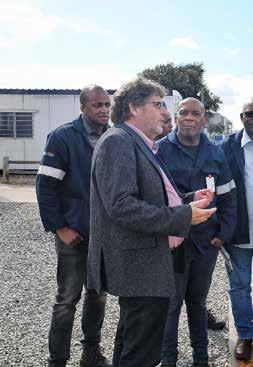
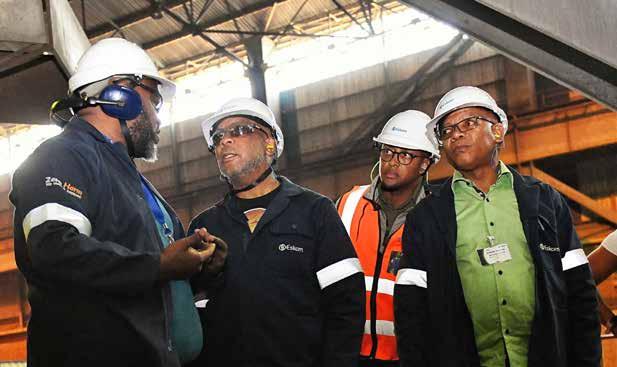
The visits allowed the Minister opportunities to engage with management, workers and unions at the
coalface, with the aim to forge collaboration at a power station level, as part of the programme to improve generation capacity and ultimately address electricity shortage.
Below are the Minister's photos interacting with various stakeholders during the visits.

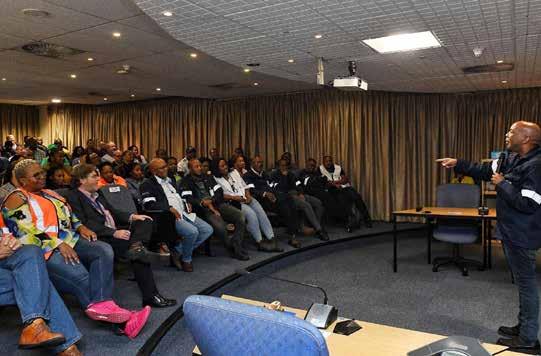
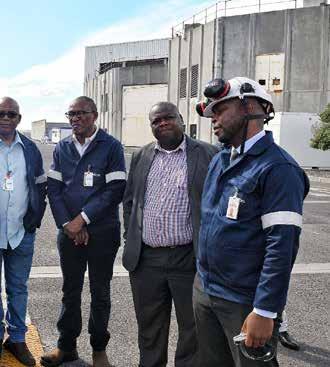

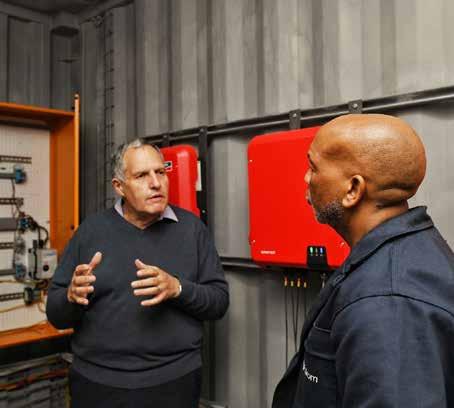
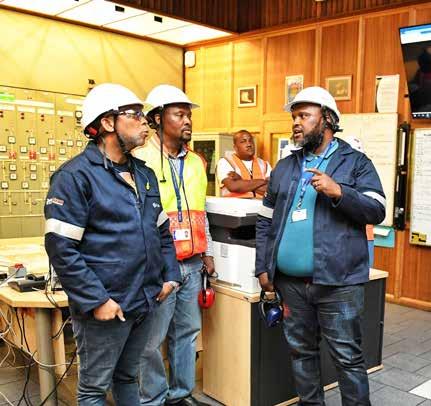


ensure that their performance is optimal and meets the needs of the developmental state. It is against this background that the Public Service Commission conducted a study titled the Investigative Analysis into the Enablers and Inhibitors of Job Performance of Senior Managers in the Public Service in 2021/22. The study explored whether the performance, narrative and existing paradigm among SMS members are consistent with the demands of a developmental state, the ambitions of the NDP and the aspirations of the Constitution of the Republic of South Africa, 1996.
Chapter 13 of the National Development Plan (NDP) concedes that one of the main challenges in the Public Service is ensuring the appointment of appropriately skilled people who demonstrate a professional ethic and commitment to the Public Service to effectively implement public policy priorities and to deliver public services.
One of the critical characteristics of a developmental state is the efficiency and effectiveness of the Public Service. Public administrators are required to shape the institutional arrangements in order to drive and implement the developmental agenda. The core of any developmental state is a wellcoordinated state administration
that is assigned to implement appropriate short-term, mediumterm and long-term development plans. Bureaucrats and technocrats play a crucial role in the actual developmental path of the state bureaucracy.
Thus, the performance of the Senior Management Service (SMS) echelon must be examined continuously in order to
The ability of senior managers and executive authorities to operate effectively within the political-administrative environment is a crucial variable in the overall capability and capacity of government to execute its constitutional mandate. Achieving the correct balance in this complex relationship is pivotal to achieving successful development outcomes, and attaining public service efficiency and it is also cited as a key feature of a successful developmental state.
The study has identified a range of factors that serve as performance enablers, and inhibitors
as well as factors that serve as enablers or inhibitors depending on contextual variables.
The findings suggest that all SMS members who participated in the study have a clear understanding of the conduct, decorum, professionalism and the essential values befitting of an ideal public servant, quality service delivery and optimal performance.
However, the proper fulfilment of the capability that already exists to shift performance from satisfactory to optimal is hindered by a number of critical inhibitors, including, amongst others, toxic organisational culture, appointment or deployment of incompetent persons into key positions, lack of support from some superiors, continuous restructuring or reorganisation, low staff morale and lack of passion for work assigned and budget cuts.
In addition, the findings suggest that the prescripts that govern the human resource management value chain are clear, but their effectiveness are undermined by non-compliance and inconsistent implementation.
The study has identified a range of factors that serve as performance enablers for SMS members, including prompt and constructive support and feedback from competent su-
pervisors, teamwork or collaboration between colleagues and departmental units, recognition by peers and superiors and exposure to training and development opportunities.
Performance inhibitors include, amongst others, continuous restructuring, incompetent supervisors, low staff morale and lack of passion for work assigned and political interference or involvement in recruitment and selection processes. However, factors such as organisational culture, restructuring or reorganisation, and competency levels of supervisors and subordinates, including employee commitment serve as possible enablers or inhibitors depending on contextual variables.
The following recommendations proceeding from the NDP and the Framework on Professionalisation of the Public Service are provided for consideration and implementation by departments to optimise the benefits of the identified drivers of SMS performance, and to influence the direction of those factors that can either become enablers or inhibitors, and prevent or minimise the negative impact of the inhibitors:
Implement merit-based recruitment, promotions, transfers and secondments.
Prohibit political considerations or involvement in the recruitment, transfer or appointment of SMS members, or limit it when dealing with heads of department appointments.
Prioritise development for SMS members (in terms of time and other types of support such as constructive feedback) training and capacity.
Expedite the process of developing and implementing a ‘holistic’ performance reward framework for the Public Service so that employees can feel appreciated, recognised and supported to achieve optimal performance.
Institutionalise the constitutional values and principles as a basis to build a professional and conducive Public Service work environment. The research recommends that mechanisms should be put in place to deal with the underlying causes of the identified inhibitors and to effectively manage or minimise the impact of already existing inhibitors. Intervention should include capacitating incompetent and non-supportive supervisors and subordinates, failing which, consequence management should be initiated; recognising and rewarding (in-kind)
dedicated, loyal and diligent employees in order to boost morale and productivity and delegating authority for decision-making and programme implementation.
It should also address capacity and budget constraints constructively by setting realistic performance targets; prevent tensions at the political-administrative interface by implementing the NDP recommendations and the Framework on Professionalisation of the Public Service.
A capable and developmentoriented state requires managers and leaders who are innovative in the development of new approaches to public administration and new technologies, and have a productive and fulfilling work life for the betterment of the lives of fellow citizens and residents.
Making the Public Service an employer of choice requires an improved skills profile of the existing and future workforce to enable greater levels of productivity and adaptability to the changing needs of the labour market and society at large. It is, therefore, incumbent on government to adopt a perspective for training and management in the Public Service that is commensurate with the needs and requirements of a developmental state.
The 2023 Innovation Conference held in the United Kingdom (UK) on 21 March 2023, brought together government leaders from across the globe responsible for the transformation and acceleration of public sector organisations and services.
An estimated 500 participants attended the conference, which was addressed by more than 20 speakers drawn from various countries, including South African Cabinet Secretary and Director-General in The Presidency Phindile Baleni.
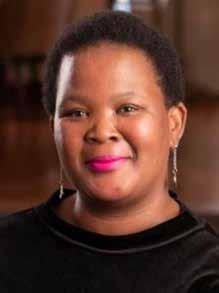
I was honoured to be part of the participants from South Africa together with colleagues from The Presidency, the National School of Government, and the departments of Communications and Digital Technology and Science and Innovation.
The conference was co-hosted by the UK Government, UK Civil Service and the Cabinet Office.
Innovation 2023 was aimed at assisting civil servants from a range of critical professions and functions, and from countries
around the world, to promote and develop new approaches to policymaking and service delivery.
Governments face a complex set of social, economic and environmental challenges, driven by rapid technological, political and demographic change. And with public finances under pressure, few can spend their way out of problems.
But by embracing innovation, the conference demonstrated that we can find solutions within the same dynamics that are constantly throwing up new challenges – adopting emerging technologies, adapting to changed cultures, and building new skills, structures and communications methods to meet the public’s evolving expectations.
Governments have no choice but to innovate. The various speakers at the conference demonstrated the need for governments to draw on the talent of the whole workforce, address the barriers within and across
departments and adapt civil servants’ tools, incentives and systems to ensure sustainable innovation.
Furthermore, officials require the tools, skills and confidence to experiment with new approaches to service delivery. The systems and structures within which they operate must support and promote intelligent risktaking. And they need to work in partnership across professional and organisational boundaries, assembling the right skills and capabilities to rebuild services around users’ needs.
My insight from this conference is that innovation is for everyone, not for technologists only. We don’t need more money to innovate, there are already so many resources being channelled into Information and communication technology systems and processes aimed at the delivery of quality services at large. We must involve employees at different levels and support them to raise awareness of innovation and their role. Institutions like the
Centre for Public Service Innovation have a greater role to play to lead, inspire and engage public servants to be innovators.
As the Department of Public Service and Administration, we will continue to take up our role at the policy level by setting norms and standards that enable and do not constrain innovation in the Public Service.
Drawing on the expertise and views of all those attending the Innovation Conference presented a unique opportunity to explore the keys to innovation with colleagues from around the world.
*The article was first published by The Public Servant Quarterly Magazine for the Public Service.




Water and Sanitation Minister Senzo Mchunu and Northern Cape Premier Dr Zamani Saul have hailed the public-private partnership between the Mining Leadership Forum (MLF) and the Department of Water and Sanitation (DWS), which saw the completion of the first phase of the Vaal-Gamagara Water Supply Scheme.
The R1.7 billion water supply scheme, which is located in John Taolo Gaetsewe District Municipality, is a joint venture between the DWS and the local mining forum.
The project, constructed by Bloem Water as the implementing agent, was completed in June 2022. It included the upgrading of a 75-kilometre (km) existing steel pipeline to benefit various water users, including mines, municipalities, the agricultural sector and approximately 6 000 households in Gamagara and Tsantsabane local municipalities.
Handing over the completed project to Bloem Water to
manage, Minister Mchunu said the completion of the project was due to the collaboration between government and the MLF, which funded the project to ensure that water challenges are addressed in the John Taolo Gaetsewe District.
“We appreciate and acknowledge this contribution made by the MLF and this justifies the fact that government jointly with private organisations can work together to expedite service delivery,” said the Minister.
He acknowledged the importance of public-private partnerships, saying government has demonstrated that it can build trust with private institutions for the benefit of the people.
“Let us use this trust and make this completed project thrive for the advancement of service delivery. The water sector needs more of these partnerships to ensure that water is brought to people’s homes, thus changing their lives for the better.”
Premier Saul welcomed the completion of Phase 1 of the project, which will address most
of the water supply challenges in the district.
The Northern Cape mostly comprises desert areas which lack rainfall and the construction of the pipelines will see many more homes receiving clean drinking water.
“We truly believe that the only way we can improve the quality of lives of the people is through massive investment in social infrastructure, and that includes the provision of fresh water supply and dignified sanitation to the communities.
“We have witnessed the execution and the success of this water project, and we are looking forward to the second phase of the pipeline project,” said the Premier.
Sifiso Nxumalo, from the MLF,
said the refurbishment of the pipeline prioritised communities as the main beneficiaries, and it has ensured that more megalitres of water per day are provided to benefit households that have been struggling with clean, fresh water supply in the district.
Minister Mchunu said the department will forge ahead with the partnership with the MLF for Phase 2 of the Vaal-Gamagara Water Supply Scheme, which is worth a total of R4.8 billion.
“The second phase of the water project is also about the upgrading of a 260-km remaining pipeline, from the Vaal River Pump Station to Roscoe near Kathu in the Gamagara Municipality,” he explained. – SAnews. gov.za

As the country moves from Human Rights Month
(March) to Freedom Month (April), government continues to address challenges that threaten the gains made so far in building a better South Africa for all.
Since the dawn of democracy in 1994, South Africa continues to battle with racism.
Speaking on day one of a three-day National Conference on the Constitution recently, President Cyril Ramaphosa emphasised that government is compelled to address racial boundaries and inequalities that still exist within society.
“The contours of our racist

and sexist past still feature in private and public institutions, in business, in access to skills, wealth and opportunity, and in the spatial configuration of our cities, towns and rural areas,” he said.
The National Action Plan (NAP) to Combat Racism, Racial Discrimination, Xenophobia and Related Intolerance is one of the initiatives that government is using to build a more inclusive South Africa.
“The NAP to Combat Racism, Racial Discrimination, Xenophobia and Related Intolerance provides the basis for the development of a comprehensive public policy against racial discrimina-
tion. It is complementary to the Constitution and other laws, policies and frameworks that aim to combat discrimination and protect the right to equality,” says the Department of Justice and Constitutional Development (DOJ&CD).
Government first made mention of the draft plan at the Human Rights celebrations in 2016.
Cabinet has reiterated that it remains committed to the constitutional responsibility of protecting the human rights of all people in the country.
A recent post-Cabinet briefing stressed the importance of working together to ensure that no one is left behind in making
the provisions of the Constitution of the Republic of South Africa, 1996 and the Bill of Rights a lived reality for all.
Over the years, government has encouraged South Africans to foster greater social cohesion, nation building and a shared national identity adding that it is the duty of the nation to strive for inclusive socio-economic development, while ensuring that the country combats racism, racial discrimination and all related intolerances.
The plan provides the basis for raising awareness of anti-racism, equality and anti-discrimination issues and developing collective responses.
The DOJ&CD has been the focal agency for coordinating the implementation of the NAP to Combat Racism, Racial Discrimination, Xenophobia and Related Intolerance. The implementation of the plan is premised on the approach that it belongs to all and that its implementation requires a collaborative approach. In the foreword of the plan, President Ramaphosa notes that racism and racial discrimination continue to be felt in society alongside other forms of prejudice, sexism, xenophobia, homophobia, hate crimes and hate speech.
With 2023 marking the fourth anniversary of the launch of the action plan, several key indications, including an integrated government strategy on public education pertaining to antidiscrimination, have been finalised. The strategy is expected to contribute to an improved, coordinated, government-wide approach to public education and raising awareness on antidiscrimination issues.
In addition, the DOJ&CD continues to conduct various activities in collaboration with relevant stakeholders such as the Anti-Racism Network of South Africa (ARNSA) and other partners during Anti-Racism Week which takes place annu-
ally from 14 to 21 March.
The ARNSA was set up by the Ahmed Kathrada and the Nelson Mandela foundations in 2015. The network aims to ensure that local organisations are capacitated to deal with issues of racism within communities. It also aims to form part of national and international efforts to tackle the issue.
Developments made through the action plan include the department’s continued cochairing role in the United Nations Protection Working Group (UNPWG) with the United Nations High Commissioner for Refugees. The UNPWG provides a platform for exchange of information on issues pertaining to the protection of foreign nationals, including refugees and asylum seekers and agree on actions that may be required in order to address problems faced by foreign nationals. The working group plays a vital role in escalating threats of attacks against foreign nationals to the Justice Crime Prevention and Security Cluster.
Other government departments, including International Relations and Cooperation, Home Affairs and the South African Police Service (SAPS) are members of this working group.
Work that has also been done includes the establishment of the rapid response task team
aimed at developing a Rapid Response Mechanism (RRM) that will be linked to an early warning system. The RRM will also collate incidents of racist and xenophobic offences that are reported to the SAPS and other law enforcement agencies.
“The first meeting of the RRM task team took place on 10 March 2022. Work by the DOJ&CD, in collaboration with various stakeholders towards operationalising the RRM, is ongoing,” explains the department.
Stakeholders have also established the NAP governance model which has been approved by Cabinet. The structure was inaugurated and established on 25 March 2022 to signify the political will in the fight against all forms of discrimination. The structure, which comprises eight ministries, based on the crosscutting issues covered by the NAP is chaired by the Minister of Justice and Correctional Services.
The establishment of two further operational structures, namely the Programme Implementation Committee and Technical Task Teams are currently underway.
With Human Rights Month having ended and the country‘s focus shifting to Freedom Month,
the DOJ&CD reiterates that the country’s Constitution is one of the best in the world.
“Our Constitution has a Chapter 2 (Bill of Rights) that enshrines various rights guaranteed therein, and is dedicated to ensuring respect for and upholding of the human rights of all who live in South Africa. This is evident and set out in the rights as outlined in the Bill of Rights,” it said.
The department notes that there are high levels of reported incidents of discrimination and intolerance, which people still experience on a daily basis.
“This can be linked to high levels of inequality, poverty and unemployment that the majority of our people, especially vulnerable groups such as the youth, women, refugees and asylum seekers experience on a daily basis.
“Notwithstanding the above, there are well-established national policies, legal instruments and mechanisms to address these scourges and human rights violations, such as the Chapter 9 institutions, Equality courts and various other fora that are mandated to investigate and provide redress, and to combat discrimination based on racism and all related forms of intolerance,” notes the department.-SAnews.gov.za
To give that much needed shot in the arm of South Africa's Economic Reconstruction and Recovery Plan, South Africans are urged to embrace locally produced goods, thus supporting local businesses while contributing to the creation and preservation of jobs.
To further this cause, Proudly South African (Proudly SA) hosted its 11th annual Buy Local Summit and Expo at the Sandton Convention Centre from 27 to 28 March.
Speaking at the event Trade, Industry and Competition Minister Ebrahim Patel noted that it should not only be government that procures locally produced products, but that the private sector and citizens need to also play their part in supporting local business.
“I urge you to do more to publicly advocate the great work that South African businesses,
small businesses and the workers are doing,” he said.
The aim of the event was to encourage all spheres and agencies of government to prioritise localisation in their procurement processes.
The summit also sought to educate consumers on the importance of buying local and the impact it has on job creation and the much-needed economic growth. It also encouraged the
private sector to increase its uptake of locally sourced and manufactured goods and services required for their day-today operations.
Proudly SA Chief Executive Officer Eustace Mashimbye explained that the expo was a great platform that adds value to aspiring entrepreneurs and offers networking opportunities with large corporates in South Africa.
“Proudly SA plays its part in alleviating poverty and unemployment through its broader buy-local campaign, and as a flagship event of the organisation the summit has multiple objectives aimed at maximising the reach and impact of the campaign”.
About 200 local companies, mostly small businesses and start-ups, were given an opportunity to showcase their products. They showcased high quality homegrown goods, from toys and kiddies’ educational material, stylish furniture and electronics for home and office use to tasty food and drinks, as well as utility and luxury vehicles.
PSM spoke to the owner of Love Mina, Tilana van Vuuren from Port Shepstone in KwaZulu-Natal.
“We are a toy and children’s product manufacturer. Our first official product is the Love Mina rag doll. The business was born when I realised that there are no rag dolls that are reflective of South African children. My daughter is mixed-race and I wanted her to have a doll that she can relate to, with her golden skin and curly afro hair,” she said.
The Love Mina dolls come in three different skin tones (for now) and custom-made dolls can be designed for each child to even include a disability when

the client requires.
The company was established in 2022 and registered with Proudly SA.
“Being a member of Proudly SA has opened so many doors for collaboration with other South African businesses. The summit has so far been the highlight of our journey. We get to participate in celebrating the diversity of South African children and make a positive impact on our local community of women,” said Van Vuuren.
The company also celebrates
South African diversity by creating beautiful clothing designs for the dolls that reflect South African cultures.
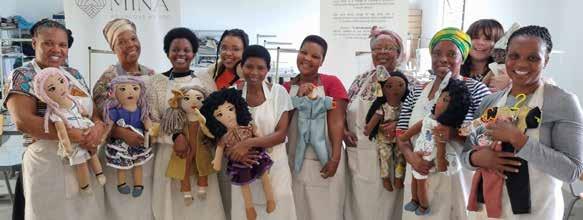

“The aim is to show young children that toys can look like them too and that they do not need to aspire to look a particular way,” explained Van Vuuren.
The company currently employs nine full-time staff members and two part-time workers.
Van Vuuren says the level of unemployment in the country also fuels her to want to contribute more to job creation.
“Every single week we have women knocking on our door asking for jobs. It is heartbreaking that we are not yet able to employ more people because a lot of people are desperate to earn a living,” she said.
Van Vuuren encouraged South Africans to buy local.
“The more awareness we bring to buying local, the more it will boost sales and the more business owners, like ourselves, will be able to employ more people. It is also important for us as small businesses to try and find a good balance between making profit and our social responsibility. We also need big organisations to support us in order for us to have a bigger impact in society,” she said.
Another entrepreneur, Thabo Kele, who was representing R.A. Vuthela Creations shared the same sentiments.
“It is important for South Afri-
cans to support locally manufactured products because if we are serious about seeing the development of our country, we need to spend our money here at home”.
“There are so many quality products that are locally produced. They are developed with care, consideration and sensitivity to our needs and interests.
Buying locally manufactured products is also important for nation-building and to stimulate economic growth. It is all about national pride and patriotism and this can go a long way for South Africa,” he said.
R. A. Vuthela Creations is based in Edenvale in Gauteng and manufactures ceramic tableware and bakeware. It was established in 2020 during the COVID-19 national lockdown.
“Our art is nostalgic and may remind you about our common upbringing, certain places and spaces,” he said.
The company also makes customised dinner sets with family names, own artwork or customer totems on products.
“This offers our clients a unique set that they cannot buy at the shops. It's very authentic and personal self-expression through ceramic art. We also sell drawings and paintings,” he said.
For more information about Proudly SA and the companies they support, visit www.proudlysa.co.za
Dull, itchy and dry skin can make life difficult as, in some instances, this can affect confidence. For some, this is common during autumn and winter. Professional Make-Up Artist (MUA) and owner of Exinia Beauty Bar, Mapaseka Mokoena, has a few tips that can help you take care of your skin, as we approach the colder months.



“There are a few different things you can do to keep your skin nourished and glowing during the dry winter months.
Of course, this is easier said than done because winter brings along harsh winds and dry air, causing all sort of beauty blunders like flaky skin. Plus, you will be exposed to a variety of artificial heaters in your car and house that contribute to skin problems,” explains Mokoena.
Here are some beauty tips that will keep your skin glowing even during the year’s coldest months:
• Drink water: About two litres throughout the day helps to keep your skin hydrated. Your skin will look clearer if you drink more water and less of other beverages.
• Keep a humidifier: It will help keep your skin from cracking or chapping in the otherwise dry air.
• Exfoliate: It is still a necessary step to your skin care

regimen, especially in winter. It washes off dead skin cells that accumulate on your face. Depending on your skin type, you can exfoliate once a week.
• Don’t skip your moisturiser: Since changes in temperature and humidity can cause changes in skin conditions, you may find that switching moisturisers helps keep your skin in tip-top shape. Try to use a thicker and more nourishing moisturiser in colder seasons. It may even be helpful to go as far as adding a night cream to your routine.
• Use sunscreen: To ensure that you have healthy and glowing skin, always use sunscreen lotion when you are outdoors.
If you are looking for an added boost of confidence in winter, make-up usually does the trick. Dewy skin makes you look young and vibrant. It leaves your skin looking well moisturised, and softens fine lines and
imperfections. It makes your skin look healthy and gives off the illusion of an active lifestyle, whether you have one or not. The foundation, blush, bronzer, highlighter and setting powder can all help you achieve a healthy, glowing skin.
Instructions: Use a foundation that matches your skin tone and apply it lightly over your face, blending it down your jaw and neck. Use a stippling brush or a blending sponge to get flawless coverage. Use a concealer to hide blemishes or dark spots on your skin but avoid applying it too heavily to keep yourself from
having a cakey appearance.
• Use a bronzer strategically. It is one of the best ways to get a sun-kissed look. Apply it on the apple of your cheeks, temples and side of the nose and follow your cheek and jaw contour to sculpture your face.

• A good highlighter will illuminate and give dimension to your face, making it look nice and sun-kissed. Blend it along
your brown bone, down the bridge of your nose and to the inner corner of the eyes. Swipe and pat highlighter along your cheekbone and blend it in for a flawless glow.

• Glowing skin is always made better with a touch of blush. Apply cream blush to the apples of your cheeks for a beautiful flush of colour.
• Use a hydrating lipstick with a subtle shine. You can also go for more of a matte finish if that suits you better. Skip lip gloss, it can end up competing with your dewy skin. Transforming your daytime make-up into a night version

Pretty eyes:

• Get winged, firstly adding a wing to your bare eye makeup is the best way to add a little drama and personality to your eyes.

• Enhance your lashes, to
Add a pop of colour to your lips, especially if you have used neutral tones throughout your face. Reds, pinks, browns and peaches are all good. However, if you want your lipstick to last past the first course or drinks, ensure you are using a lip liner throughout your lips. Also add a lighter pop of colour to the center of the bottom lip to accentuate your pout.
*Mokoena has more than 10 years’ experience in the beauty and hair industry. Her business focuses more on enhancing facial aesthetics through make-up. She is passionate about making each client feel fabulous in their own skin. You can contact her through email on exiniam@gmail.com; Instagram: exiniabeautybar or Call/WhatsApp: 073 486 7988.
further define your eyes and make them look attractive by adding another coat of mascara or [if you want more drama] add false lashes to bump up your natural lashes.
• Lastly brighten up, no nighttime look is complete without a little simmer. That extra sparkle will add just the right amount of details you need and make you look like you spent way more time crafting your look.
The autumn season can be a perfect time to practice how to prepare delicious home-cooked meals, while keeping your kitchen warm and tummies full.
PSM magazine reached out to Luxury Events Curator and Private Chef Leigh-Ann Modise, who owns Cumin Creations. The main goal of her business is to influence healthy eating across South African homes.


In this edition, Modise shares a recipe for a family meal.
“Beef tenderloin is one of the best cuts. This is a great recipe for a family dish. The preparation ensures all nutrients are not cooked out by using cooking methods such
as sautéing (frying quickly in little hot oil) and blanching by scalding vegetables in boiling water followed by quick, thorough cooling in ice water to keep the crunchy texture and vibrant colour of the green vegetables,” she says.
She recommends this recipe for any family occasion as delectable. The green medley is packed with nutrients.
“Broccoli is high in fibre whilst zuchinni has great skin benefits, and green beans promotes bone health. The vegetables are a great source to detox and keep regular,” she says.
Ingredients:
• Whole beef tenderloin fillet.
• 350g zucchini (marrow squash or courgette).
• 500g broccoli.
• 350g green beans.
• 60ml extra virgin olive oil.
• Meat basting.
• 60g salted butter.
• Thyme sprigs ( to baste your meat).
• 2 Garlic cloves.
• Salt to taste.
• Pepper to taste.
Instructions:
• Wash all vegetables and ensure all soil particles are removed.
it horizontally down the middle.
• Break the broccoli into smaller florets.
• Cut the tips of the green beans then cut them into halves.
• Prepare a bowl with ice and water to blanch your vegetables.
• Add vegetables into 500 ml boiling water for 5-7 minutes. Drain excess water.
• To stop the green medley (vegetables) from cooking further add the green medley into the ice water to blanch the vegetables.

• Remove vegetables from the ice water.
• Add olive oil into a saucepan at medium heat. Lightly saute the green medley until the vegetables are slightly charred, add salt and pepper for seasoning.
(don’t do it if the kids are at the table, unless you have a glass of milk handy).
• Trim tenderloin (when you buy this specific cut your local butcher can always trim it for you, to make it easier).
• Preheat oven at 180 °C.
• Heat up frying pan medium to high heat, place the fillet into the pan and cook each side until seared cook for about 7 minutes on each side. When the fillet is seared to your desired temperature (my favourite is medium rare).
• Add thyme sprigs, garlic cloves, butter and start basting the meat with a spoon while tilting your pan to fill the spoon with the melted meat until the whole cut is basted.
Don’t forget to season with salt and pepper. Place the tenderloin into the preheated oven for 2-5 minutes.
Remove from the oven let it rest for 3 minutes then you can carve it onto a big serving dish with the green medley accompanying this masterpiece.
“Bon Appetit,” she says with excitement.
Usually, beef tenderloin goes well with dry red wine.


Irecently had the opportunity to go aboard the MSC Orchestra Sea Cruise. I can testify that this cruise was worthy of the hype that it is afforded with.

I experienced being in a beautiful floating hotel that sailed from Durban, KwaZulu-Natal to the Portuguese Islands in Mozambique. The cruise takes place almost every week between November and March.
The ship has the capacity of carrying 2 550 guests and 1 000 crew members.
Prices on the cruise vary depending on the cabin that you choose but a trip can cost about R3 800 for three nights per person.
As for the ship’s interior – I was blown away by how beautifully furnished it was. This was a big improvement when compared to the MSC Sinfonia which I was on ten years ago.

This was a relaxed enjoyable holiday and anyone can have fun on the cruise, from children to gogos. The cruise we were on was a party experience for the young and hip. The scantily dressed crowd dances from 14:00 to 04:00. My husband and I were among the oldest people there – the good thing is that we are young at heart.
Accommodation: Cabins differ according to price. Ours was a proper hotel room with a double bed, couch, coffee table, bar fridge dressing table, closet, television, ensuite bathroom and patio with outside seating. I loved it!
Food: There was plenty of food almost round the clock
and was inclusive of fresh fruits and salads, which was great. With five restaurants onboard you'll never go hungry. Don't expect 5-star meals though. The food was just ok.

Drinks: There was a variety of bars with acceptable service. Bare-in mind that drinks can burn a big hole in your budget if you drink like a fish. I suspect drinks are what keeps the company afloat. And no, you can't smuggle in your stash from home.
The ride: The ship was surprisingly smooth but in bad weather, you can feel just a bit of wobbliness. It was not as scary as those who fear the sea might think. Most of the time you forget that you are on a ship.
Entertainment: The trip we
were on was dubbed Dineo and Friends. On the decks were Dineo Ranaka, DJ Zinhle, DJ Sox, DJ Bongz and many more. It was a vibe, think of the Hollywoodbets Durban July – a horse race held annually at Greyville Racecourse in Durban, but with everyone on a pool deck in gorgeous swimsuits. The party lasted until 04:00 daily.

Fortunately for us, we only stayed for three nights as anything longer would wear us out. There were also other activities, from comedy to theatre shows, quiz shows and sports.
COVID-19 safety: We had to provide vaccination certificates or a negative PCR COVID-19 test result.
Biggest disappointment: We were unable to go to the Por-
tuguese Island and disembark because of Cyclone Cheneso which is fairly common. Unfortunately, the weather is a big factor in sea travel. Despite this, there was enough to keep us occupied onboard.
Value for money: Overall, the experience was value for money as the price includes accommodation and all meals. Extras were priced in United States dollars which makes them very expensive. This includes drinks, WiFi, photographs and massages. If you decide not to use any of these and stick to what is offered in the restaurant as part of meals (water and juice) you get away with a holiday bargain.